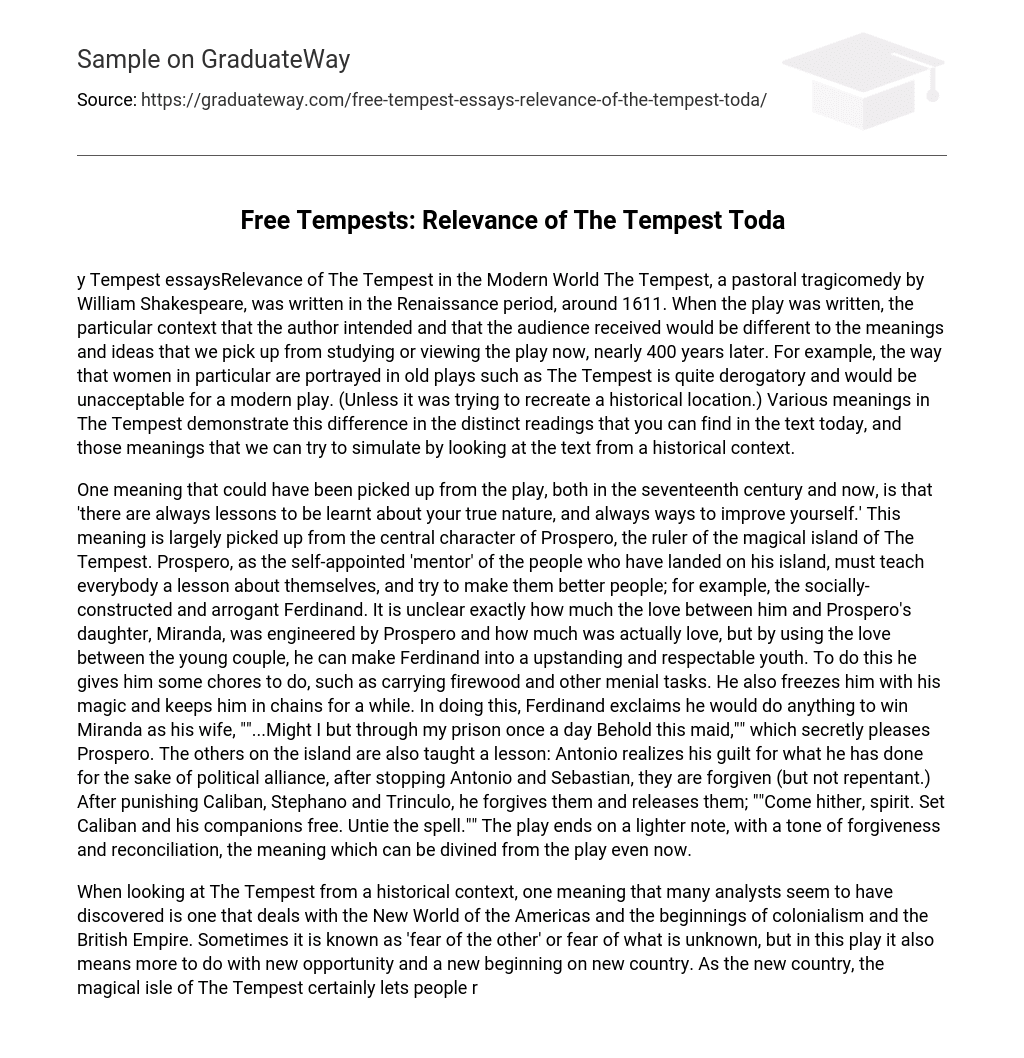Relevance of The Tempest in the Modern World
The Tempest, a pastoral tragicomedy written by William Shakespeare in the Renaissance period around 1611, presents a unique challenge in interpreting its original intent versus how it is understood today, almost four centuries later. The way women are depicted in such older plays like The Tempest would now be deemed derogatory and inappropriate unless aiming to recreate a historical setting. The multiple interpretations in The Tempest highlight the contrast between the current readings and attempts to simulate the historical context.
One possible interpretation of the play, during both the seventeenth century and present day, is that there are always opportunities to learn about one’s true essence and ways to enhance oneself. This meaning is largely derived from the protagonist, Prospero, who governs the enchanting island in The Tempest.
Prospero assumes the role of a mentor for the people who have arrived on his island. His objective is to teach them valuable lessons about themselves and guide them towards becoming better individuals. One such person is Ferdinand, an arrogant young man shaped by societal norms. The nature of Ferdinand’s love for Miranda, Prospero’s daughter, remains uncertain – whether it was manipulated by Prospero or genuine. By using the love between Ferdinand and Miranda, Prospero aims to transform Ferdinand into an upright and honorable young man. To achieve this, Prospero assigns tasks such as carrying firewood and other menial chores to Ferdinand. Additionally, he uses his magic to freeze Ferdinand and keep him in chains for a period of time. While performing these actions, Ferdinand declares his willingness to do anything to win Miranda as his wife: “Might I but through my prison once a day Behold this maid.” Astonishingly, this secret satisfaction pleases Prospero.
On the island, Antonio learns a lesson about his guilt for his selfish political alliances. After stopping Antonio and Sebastian, they are forgiven but do not repent. Caliban, Stephano, and Trinculo are punished but then forgiven and released. The play concludes with a tone of forgiveness and reconciliation, highlighting its enduring message.
When examining The Tempest within its historical context, many analysts have identified a meaning related to the New World of the Americas and the inception of colonialism and the British Empire. This interpretation, commonly referred to as ‘fear of the other’ or apprehension towards the unknown, also encompasses the notion of new possibilities and fresh starts in a foreign land.
The Tempest, as a new country, allows individuals to experience new beginnings, as all the inhabitants of the island are forgiven and returned to their true home in Italy. The play incorporates the theme of humanity’s relationship with nature, exemplified by Prospero’s act of forgiveness, which rejuvenates individuals following their troubling past. However, the concept of “fear of the other” is also depicted through the character of Caliban, a monstrous servant who is not entirely human. Interestingly, Caliban’s name is an anagram of “canibal,” reflecting the notion of savagery rather than specifically human-eating behavior in Old English.
Shakespeare’s portrayal of Caliban in “The Tempest” demonstrates a complex relationship between language and power. Engaging with Prospero’s teachings, Caliban experiences both freedom and oppression. Characterized as a beast, referred to as a ‘monster’ and a ‘thing of darkness,’ Caliban’s appearance remains ambiguous; it is unclear whether Shakespeare intended him to be an ugly and repulsive human or something more peculiar and degenerate. Incapable of attempting to kill Prospero himself, Caliban enlists Stephano and Trinculo in a comical scheme to overthrow his oppressor, urging them to become his gods: “I’ll show thee every fertile inch o’th’island, and I will kiss thy foot. I prithee, be my god.” Over the past four centuries, attitudes towards various issues, including colonialism and slavery, have significantly transformed.
Caliban embodies the oppression and colonization of indigenous people and their territories by the Western world in modern times. Specifically, Caliban is the offspring of the influential enchantress Sycorax, who used to govern the island. Although he was in line to inherit power, Prospero arrived and assumed leadership.
Interestingly, this is yet another instance of power being taken over. However, unlike other cases, this involves a cultured man displacing a ‘monstrous tortoise’. The text does not condemn this action, despite Caliban’s insistence that “This island’s mine, by Sycorax my mother, which thou tak’st from me.” From a contemporary viewpoint, Prospero can be perceived as a slave driver, as he keeps Ariel as a servant. Additionally, he can be seen as racially biased. Moreover, in today’s perspective, Prospero would be criticized for being excessively overprotective of his daughter and controlling her life.
It is crucial to consider the historical context of the time when the play was written when analyzing it. During that period, the behavior displayed by a father, as portrayed in the play, would have been deemed normal. Despite this, Miranda stands out as a more contemporary depiction of a young woman, not conforming to the traditional expectations of being quiet and reserved. She openly shares her emotions.
Clearly, not all the interpretations that the original audience and analysts of a play had at the time of its first writing are completely lost on present-day text researchers. However, societal and cultural changes can greatly affect the range of interpretations accessible, particularly for those unfamiliar with historical and social context information. During the study of a text, it is crucial to consider the reading perspective of the audience or student from a contemporary context. Simultaneously, examining the text through a historical lens can expand the scope of interpretations and facilitate comprehension of certain elements within the text.





